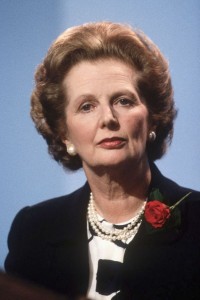 There really was no modern British Prime Minister who presided over a greater transformation of the nation’s economy than Baroness Margaret Thatcher. When she left office, nearly every aspect of British economic life had changed fundamentally.
There really was no modern British Prime Minister who presided over a greater transformation of the nation’s economy than Baroness Margaret Thatcher. When she left office, nearly every aspect of British economic life had changed fundamentally.
People will debate for a long time what she meant when she said “there’s no such thing as society”. But in Britain in the late 1970s it’s fair to say there was no such thing as the consumer. When she left, politicians spoke of little else.
Her critics would say she got rid of the rules and institutions that had been holding British society together. Supporters would point to those same rules and institutions as the forces holding our moribund 70s economy back. But for better or worse, we can agree that she helped force the rise of the individual at the expense of the collective.
In the wake of World War II, Britain – and most other countries – put the state in charge. For decades after, the assumption of Labour and Conservative governments alike was that the state knew best.
Power to the consumer
The rule was “regulate first, ask questions later”, and if you wanted to consult someone about it you talked to the unions, or the CBI. In policy terms, the individual consumer was nowhere to be seen.
Whether it’s the reform of the unions, the end of exchange controls, mass privatisation, sale of council houses, or Big Bang, the big thing about Margaret Thatcher was that she was the first leader of a major economy to seriously confront that statist post-war consensus.
She wasn’t the only one. The first stirrings of a global move against the state were already there, when she came to office. It was Jim Callaghan, after all, who famously said we could no longer “spend our way out of a recession”.
And of course Ronald Reagan was elected soon after her, in 1980. Had Jimmy Carter been re-elected, the story of Margaret Thatcher’s first term might be told rather differently.
LIFE OF MARGARET THATCHER
- 13 October 1925 – Born Margaret Hilda Roberts in Grantham, Lincolnshire
- 1951 – Married businessman Denis Thatcher
- 1959 – Becomes MP for Finchley
- 1970 – Made minister for education
- 1975 – Elected Conservative leader
- 1979 – Becomes UK’s first female prime minister
- 1982 – Falklands War
- 1983 – Elected prime minister for second time
- 1984 – Survives Grand Hotel bombing
- 1984-5 – Takes on unions in Miners’ Strike
- 1987 – Wins third term in Downing Street
- 1990 – Resigns as prime minister
- 1992 – Stands down as MP and accepts peerage
- 2002 – Retires from public speaking
- 8 April 2013 – Dies after suffering a stroke
In many ways, her battles in those first few years in power were macroeconomic. They were about raising interest rates to double figures to confront inflation, and raising taxes, in the teeth of high and rising unemployment, in 1981. Most of the battle to change the way the economy worked at the grassroots level came later.
Mixed legacy
But, for all that, Thatcher was probably the politician who took on the collectivist impulse with most conviction, against the bitterest opposition.
There’ll be more to say about her legacy in the days ahead – for example, on her mixed record on public spending, and how it compares with George Osborne’s own plans for the state.
But for any economist, the shift in favour of the market is the legacy to remember first. That is the change that is literally all around us, and very unlikely to go away.
In the wake of the financial crisis, some say the market is now too free – that we give too much power to the consumer, and pile too much risk onto the individual. That’s an important and ongoing debate.
But, we shouldn’t forget how little governments trusted markets or individuals back in 1979. I doubt you would find many critics of modern capitalism who would want to turn the clock back to 1979.
Certainly, none of the Labour politicians who have been making their condolences this afternoon would consider it for a single second.
http://www.bbc.co.uk/news/business-22070285
